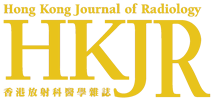Revisiting the Role of Anti-angiogenesis Therapy in Metastatic Breast Cancer
CH Kwok
Hong Kong J Radiol 2012;15(Suppl):S57-63
Angiogenesis is essential for tumour growth and metastasis, and constitutes an important process in the control of cancer progression. The use of anti-angiogenic agents, particularly those targeting vascular endothelial growth factor, has become an integral component of anticancer regimens for many tumour types. Bevacizumab, a monoclonal antibody against vascular endothelial growth factor, is one of the most extensively studied targeted agents and has demonstrated significant clinical benefits in several solid tumours, including breast cancer. In metastatic breast cancer, randomised phase III trials have consistently demonstrated that bevacizumab, when combined with standard first-line chemotherapy regimens, significantly improved response rate and progression-free survival compared with chemotherapy alone. A recent phase III trial has also demonstrated a statistically significant improvement in progression-free survival with the addition of bevacizumab to second-line chemotherapy regimens in patients with previously treated metastatic breast cancer. Bevacizumab is generally well tolerated, with a limited impact on chemotherapy toxicity. Typical adverse events include hypertension, proteinuria, bleeding, and thromboembolic events, which are usually manageable. The use of bevacizumab in combination with paclitaxel as first-line therapy for human epidermal growth factor receptor-2–negative metastatic breast cancer has been approved in more than 80 countries worldwide, including Hong Kong, Australia, the European Union, Korea, Malaysia, New Zealand, Switzerland, and Taiwan. This article summarises current data pertaining to the efficacy and safety of bevacizumab when combined with chemotherapy for the treatment of metastatic breast cancer from phase III studies and large-scale meta-analyses.
中文摘要
重溫抗血管新生療法在轉移性乳癌中的角色
郭子熹
血管新生是腫瘤生長和轉移的必要條件,因此亦是構成控制腫瘤擴展的一種重要步驟。抗血管新生 劑,尤其那些針對血管內皮生長因子的藥物,已成為治療不同腫瘤的重要組成部份。Bevacizumab 是一種針對血管內皮生長因子的單克隆抗體,是在不同腫瘤中(包括乳腺癌)有顯著臨床效益的其 中一種最廣泛研究的標靶藥物。轉移性乳癌的隨機III期臨床試驗顯示bevacizumab結合標準一線化 療方案,與單純化療相比,能顯著提高反應率和無進展生存期。近期的III期臨床試驗也顯示曾接受 治療的轉移性乳癌患者的二線化療方案中加入bevacizumab能明顯改善無進展生存期。一般來說, bevacizumab耐受性良好,對化療毒性影響有限。典型的不良反應包括高血壓、蛋白尿、出血和血栓栓塞,而這些反應一般可以臨床處理。全球80多個國家,包括香港、澳洲、歐盟、 韓國、馬來西 亞、新西蘭、瑞士和台灣,都已經批准使用bevacizumab聯合paclitaxel作一線治療人類表皮生長因子 受體-2陰性的轉移性乳癌。本文總結了從轉移性乳癌的III期臨床試驗和大規模的統合分析中所得的 數據,討論有關的療效和安全性。

